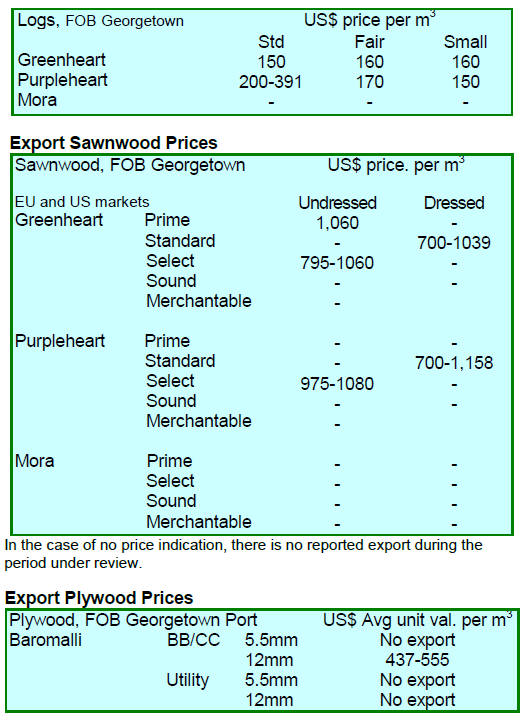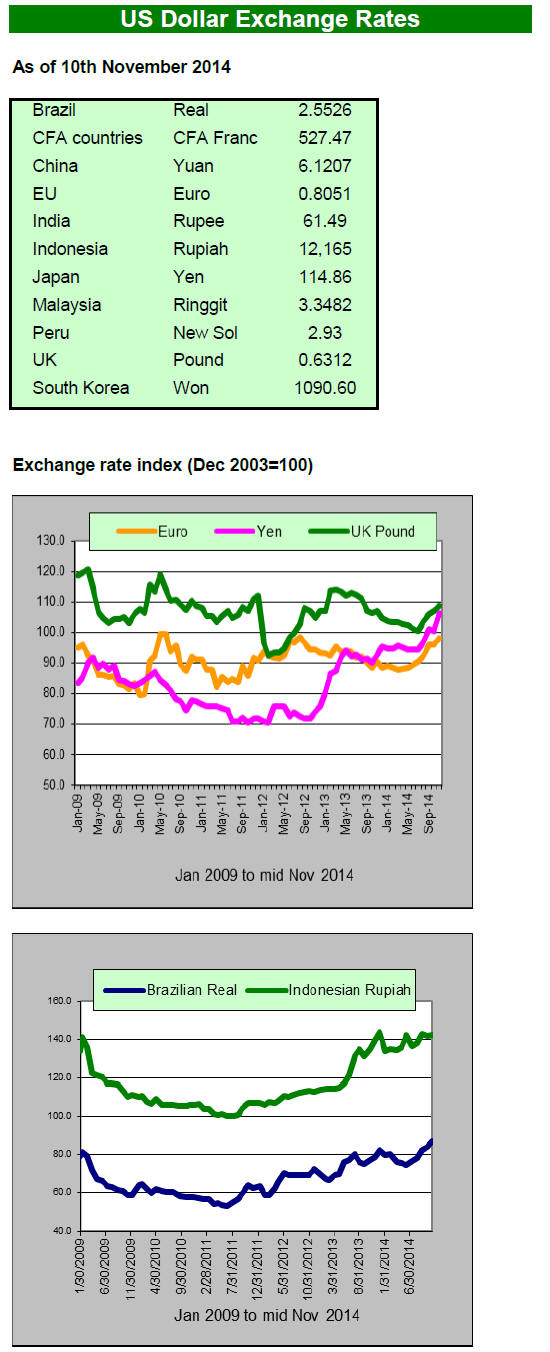2. GHANA
Ghana’s 8-Months wood product exports up
15%
In the first eight months of this year Ghana exported
209,928 cubic metres of wood products earning Euro
84.23 million.
Export volumes in the first eight months of 2014 were
14.8% higher compared to the same period in 2013.
The export performance January to August 2013 and
2014
is shown below.
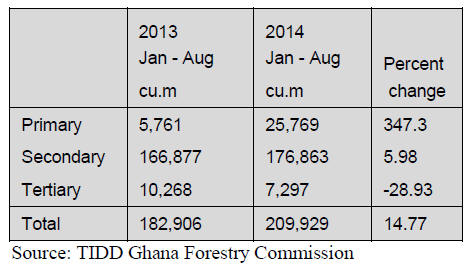
The export of primary products (poles and billets)
and
secondary products (sawnwood, boules, veneers,
blockboard and plywood), continues to rise but 2014
exports of tertiary products dropped by 29% compared to
the same period in 2013.
The major markets for Ghana‟s wood products are Africa,
Europe and Asia which, together, accounted for about
92% of all exports. Details on export destinations are
shown below.
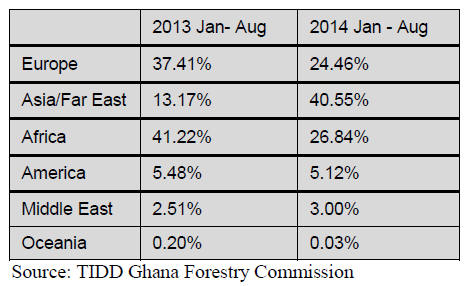
Teak, papao (Afzelia africana; A. bella), dahoma,
senya,
ceiba, wawa, mahogany, sapele and odum were some of
the major species exported during the period reviewed.
Businesses Confidence Improves
As a consequence of the recent appreciation of the
Ghanaian currency against the US dollar and other major
currencies the Association of Ghana Industries (AGI) has
reported that businesses confidence improved slightly in
the third quarter of 2014.
An AGI Business Barometer study attributed much of the
improvement to the reversal of the recent Bank of Ghana
regulations on foreign currency transactions in the second
quarter of the year as this led to improved exchange rate
stability.
The business confidence index was at a low of 22 in the
second quarter survey but was assessed at 42 in the third
quarter survey. According to the Chief Executive Officer
of the AGI, Mr. Seth Twum-Akwaboah, major challenges
that continue to be a stumbling block to industry are
unstable power supplies, access to and the cost of credit
and the multiplicity of taxes.
In another development, the AGI plans to set up a
development bank, to offer members an alternative to the
current commercial banks. The new bank will provide
easier access to finance for members and help make
Ghanaian businesses competitive.
At a media launch organised by Strategic Communications
Africa, Mr. Asare-Adjei said, research showed that about
80% of the credit offered by commercial banks is only
short-term while AGI industries are in need of medium to
long term financing.
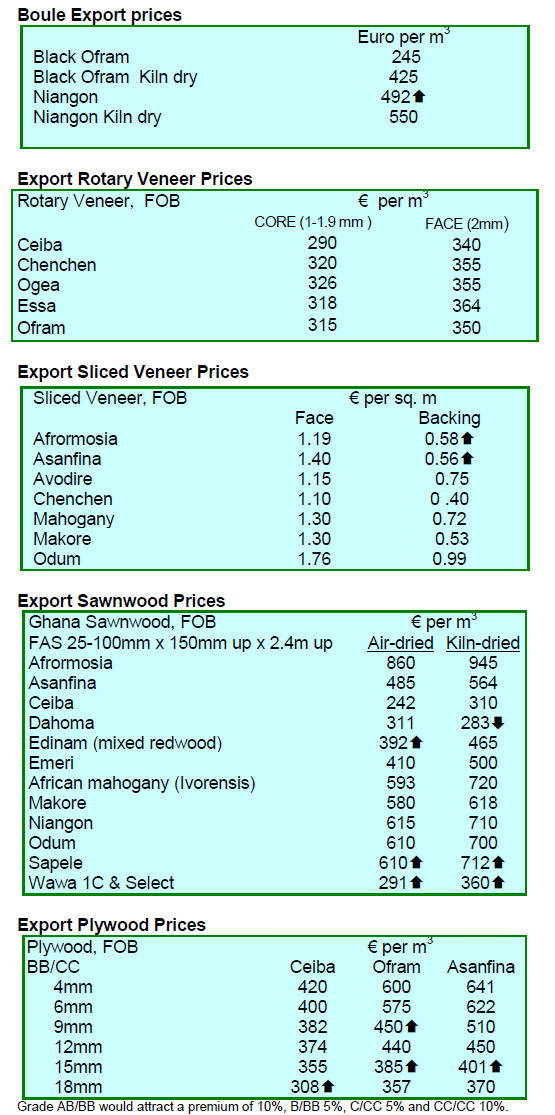
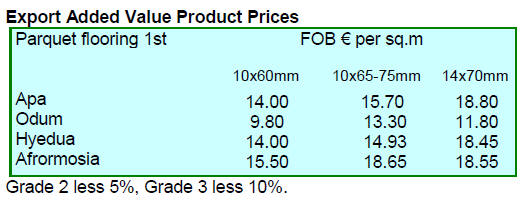
3. MALAYSIA
Sabah Forestry Department centenary
The Sabah Forestry Department has just marked its 100th
anniversary with a grand celebration and two conferences.
The Forestry Department was established in in 1914 with
only six staff.
Speaking at one of the events the Chief Minister of Sabah,
Musa Aman, reported that his administration has signed
some 31 international agreements and memoranda of
understanding worth around US$22 million for
investments into the development of the forestry sector in
the State.
As part of the 100th anniversary an international
conference was held in Kota Kinabalu, Sabah themed
“Enhancing Biodiversity towards No Net Loss and
Beyond within the Heart of Borneo Landscape”.
This attracted about 700 participants from various
backgrounds and different parts of the world. The
conference focused on biodiversity conservation and the
development of sustainable economic activities utilising
natures „capital‟.
The Heart of Borneo Initiative Declaration was signed in
Bali in February 2007 to reflect the commitments of
Malaysia, Indonesia and Brunei Darussalam in conserving
and managing one of the most important centres of
biodiversity in the world, the centre of the island of
Borneo.
In an opening speech the Malaysian Minister of Natural
Resources and Environment, G Palanivel, pledged the
support of the Federal Government to the Heart of Borneo
concept reiterating that both the Federal and State
governments must work together and adopt best practices
in forest management and biodiversity conservation.
He further said the key to sustainable development is the
restoration of the full productive capacity of the forests,
rationalising forest land use from ecological and social
perspectives.
Sabah to launch massive forest restoration
programme
The 17th Malaysian Forestry Conference (MFC) was held
in Kota Kinabalu as part of the celebrations. The MFC is
held once every three years and brings together foresters
from the Forestry Departments in Sabah, Sarawak and
Peninsular Malaysia.
The Chief Minister of Sabah, Musa Aman, commended
the State Forestry Department for fostering collaborative
ties with various agencies such as the international Society
of Mangrove Ecosystems which conducts mangrove
rehabilitation activities, the European Union which works
on climate change through REDD+ and Kyoto University
which is collaborating on management of biodiversity.
Sam Mannan, Director of Sabah Forestry Department, said
over the next 20 years a massive programme of forest
restoration will be undertaken.
Strong political push towards legality verification in
the Sarawak
The political push towards legality verification in the
Sarawak timber industry continues. The latest
development, reported in the Borneo Post, is the move to
severely punish licensees who harvest outside their
concession area since this is a breach of the terms and
conditions of their license.
Awang Tengah Ali Hasan, the Sarawak Minister for
Resource Planning and Environment, said, when caught,
offenders will be prosecuted just like unlicensed loggers or
individuals who extract timber illegally.
He reported there had been cases of illegal logging
involving licensed timber companies, unlicensed loggers
and individuals encroaching onto state land claiming
native customary rights as a pretext for clearing the land
for agricultural purposes.
In related news, Sarawak State authorities have seized
illegal logs worth more than one million ringgit in Lawas,
East Sarawak. This comes after a raid conducted as part of
the state-wide anti-illegal logging and anti-graft operation.
The Malaysian Anti-Corruption Commission (MACC) has
seized over 1,000 illegally harvested logs of various
species.
Zahari Ahmad of the General Operations Force said the
Forest Department estimated the seized logs to be worth
RM1.3million. The MACC said that illegal logging cost
the state government some RM43mil (approx. US$12.8
million) in revenue in the first nine months of this year.
4. INDONESIA
SMEs to benefit from change to timber
legality
verification system
The Indonesian press has reported that the Ministry of
Commerce plans to drastically reduce the requirements for
the SVLK (Timber Legality Verification System) which is
currently mandatory for all timber and wood processing
companies.
The main reason quoted for the change is that verification
of legality under the SVLK is expensive and unaffordable
for small and medium industries.
The Ministry of Commerce is proposing to make
legality
verification mandatory only for suppliers of wood as the
supply chain is more manageable. With this change
wooden furniture manufacturers and exporters will not be
subject to mandatory SVLK certification. The proposed
change is due to come into effect 1 January 2015.
For more see:
http://bisniskeuangan.kompas.com/read/2014/11/04/201946926/
Pemerintah.Perlonggar.Aturan.Wajib.Telusur.Kayu
Two months to merge ministries
The Ministry of Forestry has issued a press release on the
merger of the Ministry of Forestry and Ministry of
Environment. Environment and Forestry Minister Dr. Ir.
Siti Nurbaya Bakar, hopes that work to merge the two
ministries will proceed smoothly and can be achieved over
the next two months as directed by the Cabinet.
Dr. Nurbaya Bakar recently visited the Ministry of
Forestry and was briefed by the Secretary General of the
Ministry of Forestry Dr. Hadi Daryanto.
In the transition period the new minister requested that
ministries should continue to implement the current work
programmes until year end.
The new minister said that one focus of future work will
be simplifying the licensing process in the two institutions
so that there will be no overlapping licenses.
Australia considers recognising TLAS
An agreement between Australia and Indonesia on
recognition by Australia of Indonesia‟ timber legality
verification system is expected. This agreement will
provide the opportunity for Indonesian exporters to expand
wood product sales into Australia.
According to the Ministry of Forestry, in the period
January-August 2014, the value of wood product exports
to Australia reached US$163,322, around 5% of
Indonesia‟s total wood product exports.
China and Japan are the first and second ranked export
market for Indonesia‟s wood. China accounts for around
38% of Indonesia‟s exports of wood products while Japan
accounts for just over 21%.
Cutting red tape to stimulate investment
The Indonesian government has indicated it will
streamline the issuance of permits and licenses by moving
ministry licenses to a one-stop service. This move is aimed
at making it easier for companies investing in the country.
According to the Minister for Economic Affairs, Sofyan
Djalil, permits from ministries such as mining, forestry
and transport will be moved to the Investment
Coordinating Board.
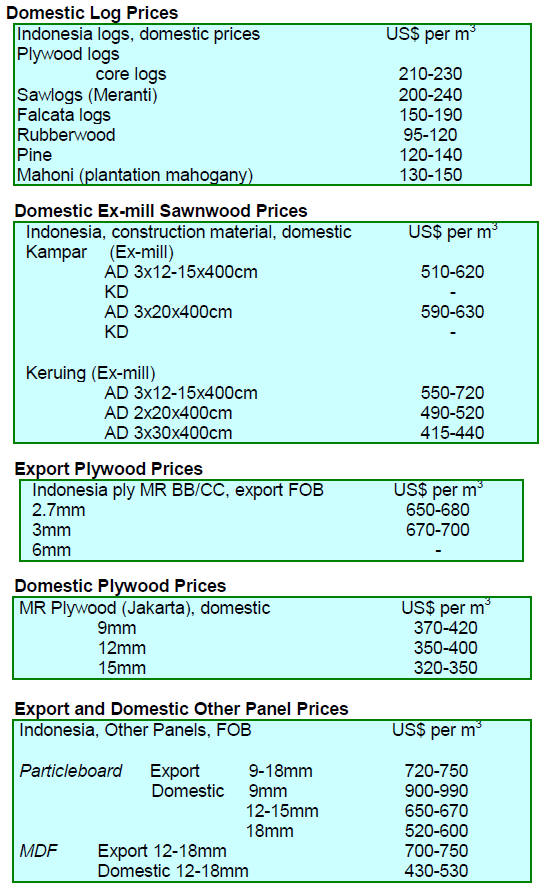
5. MYANMAR
MTE to lease its mills to private sector
A recent report in the domestic press (Daily Eleven 11
November) says that out of the 80 plus sawmills owned by
the Myanma Timber enterprise (MTE), more than 70 will
be leased to the private sector with the other mills
remaining under MTE management to supply sawnwood
for special projects by the government and for emergency
use in case of natural disasters.
The press report says that MTE will no longer supply
sawnwood to the public but will continue to auction logs
for milling by private sawmills. Since the log export ban
beginning this fiscal year, log extraction has fallen to
about one third of what was before the ban.
MTE is seeking approval from Ministry of Environmental
Conservation and Forestry (MOECAF) to lease 15
sawmills and 3 furniture factories to the private sector
during this financial year.
Sale of teak logs by MTE
On 27 October MTE sold teak logs by open tender.
Average prices for the various grades are shown below in
US dollars per hoppus ton.
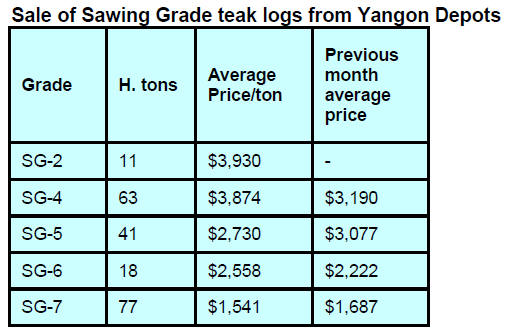
Tender prices vary according to log quality which
is
influenced by the area where the logs are harvested.
Analysts expect the depreciation of the Myanmar kyat
(MMK) to 1025 per US dollar on 6 November to have an
impact on future log price levels. The MMK has been
weakening against the US dollar since late September and
it crossed the MMK 1000 barrier on 21 October and
continues to weaken.
MOECAF speaks out on illicit timber trade
In response to questions by the media at the Forestry Joint
Venture Corporation‟s (FJV) annual meeting on 7
November, Union Minister for Environmental
Conservation and Forestry (MOECAF), Win Tun spoke on
the slow response by authorities in Yunnan Province to
curb the cross border trade in illegally harvested timber.
He said, even though he was aware the Central
Government in China has called for the Yunnan
authorities to act to end the illegal cross border trade but
little has changed.
Win Tun admitted it was not possible for Myanmar‟s
forestry officials to control illegal logging in the border
area due to security concerns.
Nyi Nyi Kyaw the Director-General of the Forest
Department (FD) also mentioned that there is a huge
demand for tamalan and padauk in China which is driving
the illegal trade.
Local analysts are of the opinion that the people living in
the affected areas feel very bitter about the continual
smuggling and suggest MOECAF and the FD open a
dialog with the Chinese authorities within the framework
of the ITTO.
6.
INDIA
Indian Panel Federation President
speaks out on
securing the domestic raw material base for industry
The following is the text of a statement made by Mr.
Sajjan Bhajanka, President, Federation of Indian Plywood
and Panel Industries on securing the availability of
sustainably produced logs for the wood based industries.
“Most of the wood based industries in general and
plywood and panel industries in particular are passing
through a very crucial stage for their existence.
Raw material insecurity, misperception about the wood
based panel industries in the mind of policy makers on one
hand and continuous increasing demand for the panel
products on the other hand has brought this sector to
crossroad.
In a country like ours (India) meeting consumer needs for
wood based panel products in a sustainable manner
becomes a much more important issue and challenging
task where still more than half of the wood produced is
used as firewood.
The panel industry embraces plywood, veneer, particle
board and MDF manufacturers. The demand projections
for wood raw materials for these products has been
estimated to be nearly 30 million cubic metres by 2020.
The government policy through the liberalisation of the
import of logs is not considered a long term viable
solution to support growth of the industry and also cannot
be taken into consideration for long term investment
decisions.
The Indian wood based industry today consists of more
than 2,000 mills of various capacities and supports the
livelihood of nearly 6 million people.
A serious drawback in the planned development of raising
plantations to meet the requirement of industry is the lack
of integration between forestry and wood based industry
sector which has resulted in diffused programmes of
planning and development.”
A document containing the following points was handed
over by the Chairman FIPPI, to the Honourable Minister
of Environment, Forests and Climate Change on the
occasion of latest Annual General Meeting of IPIRTI held
in Delhi.”
Suggested measures
Increase investments in plantations through the
involvement of the private sector and support
from financial institutions and simplifying the
procedures for the sanction of financial support to
the farmers and tree growers.
Devise a strategy for improving productivity of
agro-forestry and social forestry on degraded
lands through technology based plantations and
making available institutional credit on softer
terms and promoting involvement of private
sector in tree plantation activities.
Remove restrictions on felling, land holdings,
land tenure for tree cultivation and timber transit
rules and marketing to improve the efficiency of
wood production and better price realisation by
the growers as well as increased supply for the
Industry. Market mechanism should be developed
to ensure reasonable prices to private timber
producers.
Establish a forum for periodic discussion between
MoEF, Ministry of Industry, Ministry of
Commerce, and recognised associations of wood
based industries to review and evolve a rational
import/export policy and tariff rates keeping in
view local demand, supply and market
conditions.
Organise an annual meeting of the Managing
Directors of concerned State Forest Development
Corporations, Principal Chief Conservators of
Forests and Industry Associations well before the
submission of the Central budget to assess the
situation of the country regarding wood and
forest products‟ availability, the need for imports
and then provide necessary knowledge based
recommendations regarding the levy of customs
duties and other tariff advice and policies
concerning the same.
Relax the land ceiling laws so that wood based
industry can establish large scale and
economically viable plantations. Companies
should be allowed to enter into long term lease agreements,
free of land ceiling restrictions with farmers to
raise commercial tree plantations.
Identify and prioritise the suitable species for
raising the industrial plantation of plywood
timber.
Design a new policy framework and linkages
which would bring about a genuine integration of
the forestry sector and wood based panel industry
in the country.
Auctions of Local forest Teak at Western India Forest
Depots.
Average prices recorded at the most recent auction are as
follows:
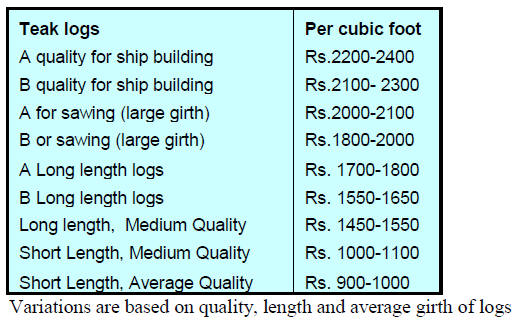
In the first post monsoon log auctions held at
sales depots
in the Surat and Vyara divisions, approximately 12,000
cubic metres of mainly teak and some other hardwoods
were offered for sale.
Good quality non-teak hardwood logs, 3 to 4 mtrs long
having girths 91cms & up of haldu (Adina cordifolia),
laurel (Terminalia tomentosa), kalam (Mitragyna
parviflora) and Pterocarpus marsupium attracted prices in
the range of Rs.750-900 per cubic foot. Medium quality
logs traded at around Rs500-600 per cubic foot while
lower quality logs sold at between Rs.300-450 per cubic
foot.
Imported plantation teak
The minimum and maximum prices for logs from
Nicaragua have changed. Prices for teak from other
suppliers remained unchanged in the period reported.
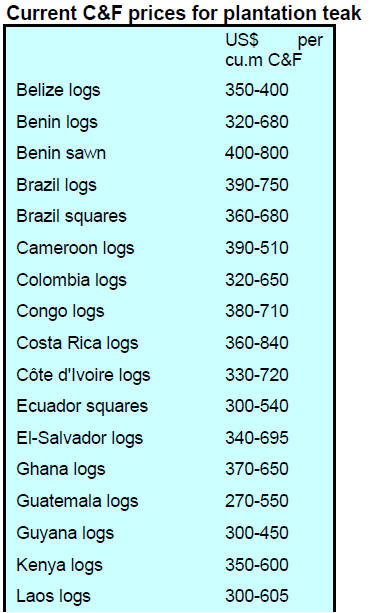
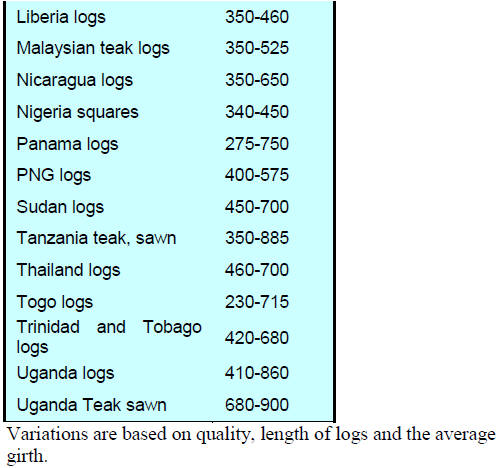
Prices for domestically milled sawnwood from
imported logs
Current prices for air dried sawnwood remain unchanged.
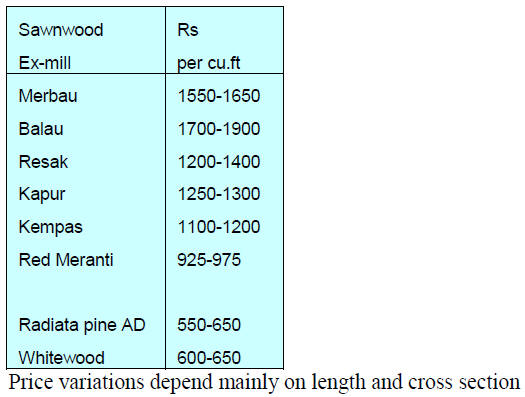
Sawn teak from Myanmar arriving in greater
volumes
Domestic mills cutting imported Myanmar teak logs have,
once again, failed to drive prices higher. Imports of teak
sawnwood from Myanmar are arriving in larger volumes
which is undermining the efforts of domestic millers to
push prices higher.
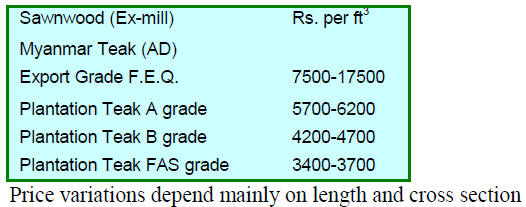
Imported 12% KD sawn wood prices per cu.ft
exwarehouse
Demand remains steady and prices remain unchanged.
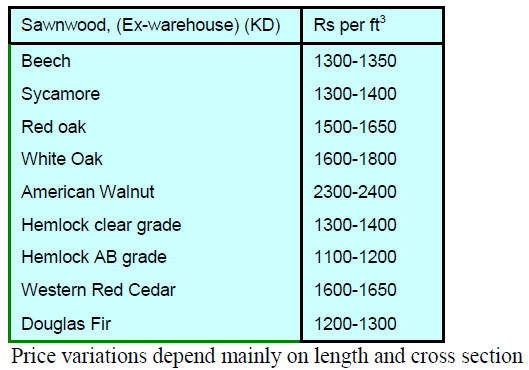
Prices for gurjan face veneers rise by 20%
After long period of poor demand for plywood and other
wood based panels some relief came in September and
October as building activity came back to life due mainly
to rising sentiment in the festive season.

Prices for gurjan face veneers have jumped by close to
20% over the past two months forcing plywood
manufacturers to raise plywood prices. Alternative species
to gurjan are being tried but end-user preferences for red
face and back veneers have to be overcome.
Poplar and okoume faced plywood is gaining a foot hold
in the market but plywood manufacturers continue their
search for other suitable timbers.
7.
BRAZIL
Furniture sector proposals sent to new
administration
The Brazilian furniture sector achieved a reasonable level
of growth up to 2012 due, in part, to the government´s
housing policies.
However, Brazil´s economy slowed significantly in 2013
such that the furniture industry only achieved a 1.8%
growth, well below the growth for the whole
manufacturing sector.
In 2014 the situation has deteriorated as , according to the
Union of Furniture Industry of Bento Gonçalves
(SINDMÓVEIS), output from the furniture sector fell
8.9% between January and August this year.
SINDMÓVEIS has suggested that Brazil's new
government should adopt policies to maintain and enhance
the furniture sector. SINDMÓVEIS suggests reducing the
tax burden, supporting greater participation in
international trade, investing in infrastructure
improvements, providing incentives to stimulate
innovation, developing a long term industrial policy and
consolidating social development and housing policies.
Brazil top plywood producer in South America
Demand for plywood (coniferous and tropical) across
South America is high and production capacity is
increasing.
The main plywood producers and exporters in South
America are Brazil, Chile and Uruguay. In 2013, Brazil
was the largest plywood producer and exporter as the
country produced 2.57 million cubic metres and exported
1.25 million cubic metres earning US$429.23 million.
Between January and October this year Brazilian plywood
exports (coniferous and non-coniferous) totalled US$381
million a 7.3% increase compared to the same period of
2013.
The main markets up to October this year were the United
Kingdom, (17%) followed by Germany (14%), Belgium
(13%) and USA (8%). Productivity has improved in
Brazilian mills through the use of modern equipment that
allows small diameter logs to be utilised.
New method for timber identification
Research by the Forest Products Laboratory of the
Brazilian Forest Service (SFB) in conjunction with
University of Brasilia has yielded a technique to identify
wood using near infrared spectroscopy and chemo-metrics.
This research began with a view to better track mahogany,
a species listed in Appendix II of CITES because
mahogany timber is visually very similar to some other
timber species.
The initial phase of the research involved the development
of a method in the laboratory which confirmed the
procedure is successful. Now field trials are underway in a
forest management area in Acre state.
Cedar and mahogany samples were used in the early tests
and it was established that the laboratory developed
method works in the field. Further fieldwork will be
conducted in Pará state.
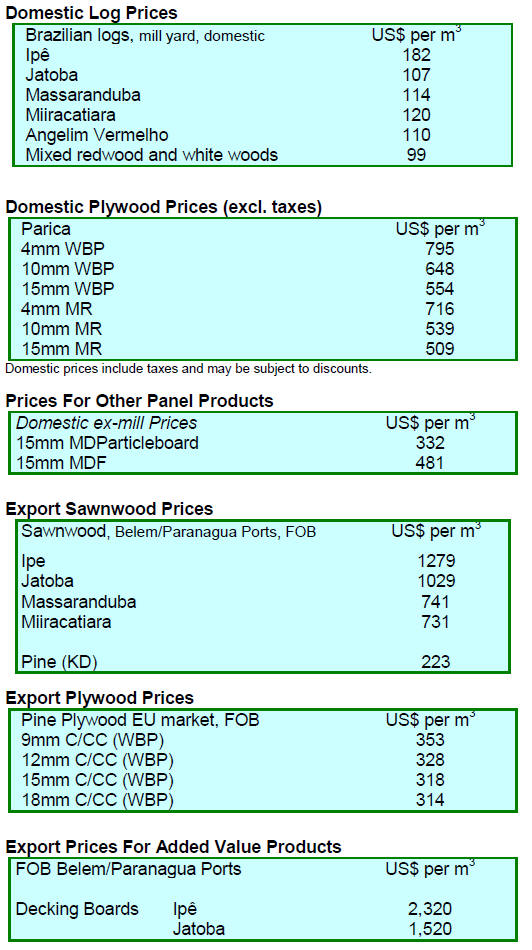
8. PERU
Madre de Dios has its first Technology
Innovation
Center.
The Minister of Production, Piero Ghezzi and Minister of
Transport and Communications, José Gallardo, have
inaugurated the first Technology Innovation Centre
(CITE) located in Madre de Dios as part of the
government‟s initiatives to drive diversification of the
economy.
The centre aims to increase productivity in the
agribusiness, aquaculture and forestry sectors. This will be
achieved through delivering advanced technologies to lift
productivity and enhance competitiveness. The Director of
the centre is a forester, Abraham Cardozo.
Advances in consultations on forest regulations
Representatives of indigenous groups recently participated
in a briefing on the regulations contained in the Forest and
Wildlife Act. The first meeting was attended by over 80
delegates from various indigenous peoples.
The representatives were informed of the articles in the
regulations that could directly affect the collective rights
of indigenous peoples.
Further regional consultations are scheduled for Tarapoto,
Satipo, Bagua, Chiclayo, Pucallpa, Puerto Maldonado and
Huancayo.
To-date, 2,500 contributions from various organisations in
the country have been received by the National Forest
Service and Wildlife (SERFOR) for the development of
the new Forest and Wildlife Law a process which began in
2012.
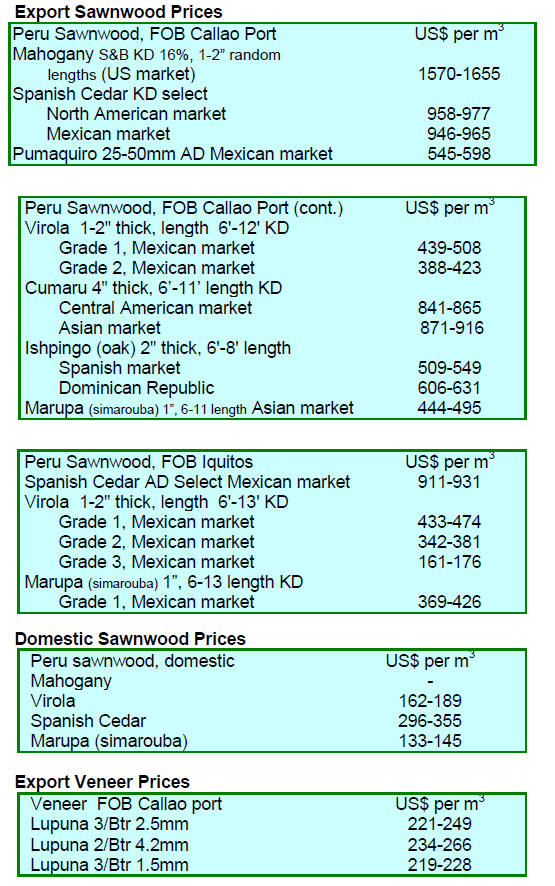
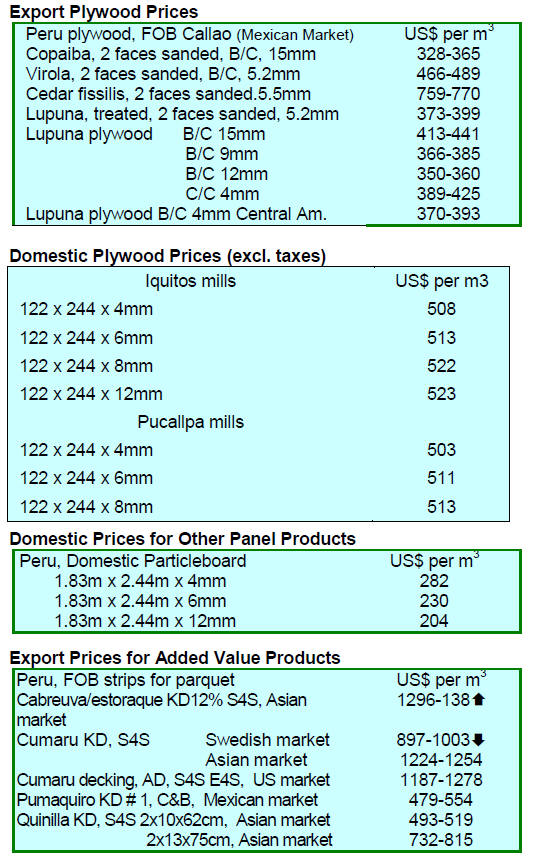
9.
GUYANA
Log export tax to rise in 2015
Through a consultative process with stakeholders the
Government has outlined a policy change with respect to
certain species exported as logs or squares. Changes in the
export tax targets two schedules for logs and one for
squares with dimensions of 20.3 cm x 20.3 cm and
greater. Beginning in 2015 taxes for Schedule A logs will
be raised by 3% while for Schedule B logs the export tax
will be raised by 2%. See below Schedules for logs and
squares.
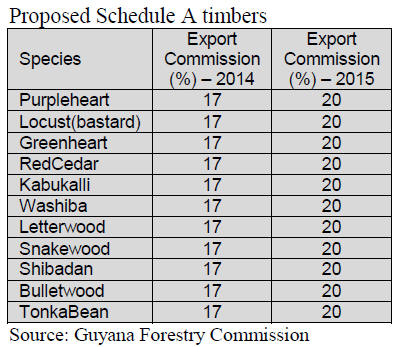
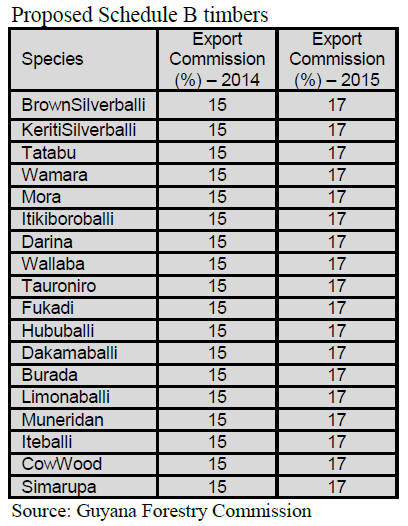
It should be noted that special consideration will
be given
to local companies or entities exporting squares (products
with dimensions of 20.3 cm x 20.3 cm and above) for
engineering end-use applications. Also the restriction on
the export of crabwood (Andiroba) and locust (Jatoba)
logs remains in place.
Export Prices
There were no exports of mora logs in the period
reviewed.
